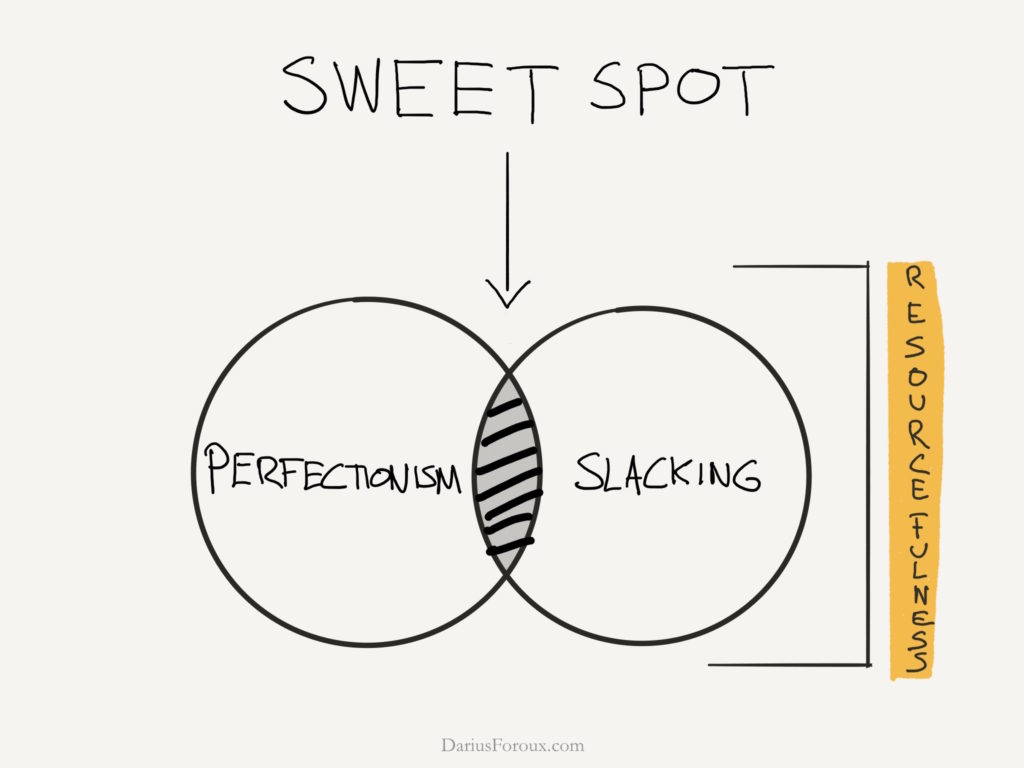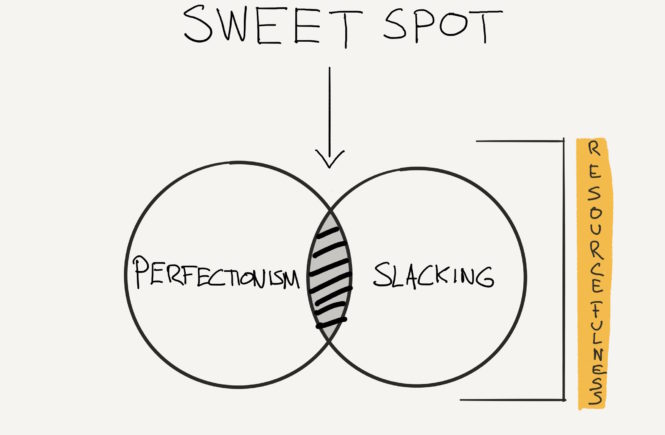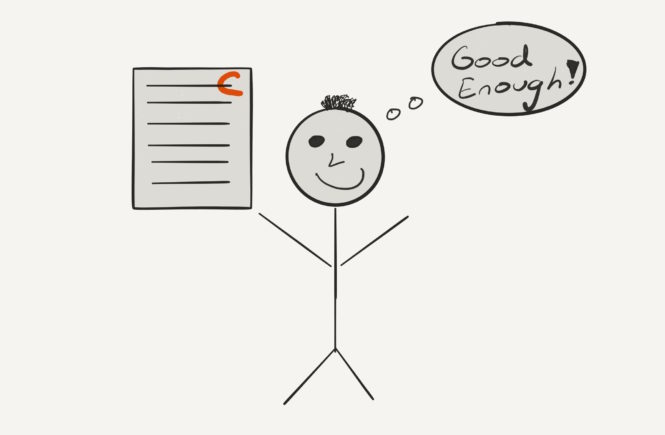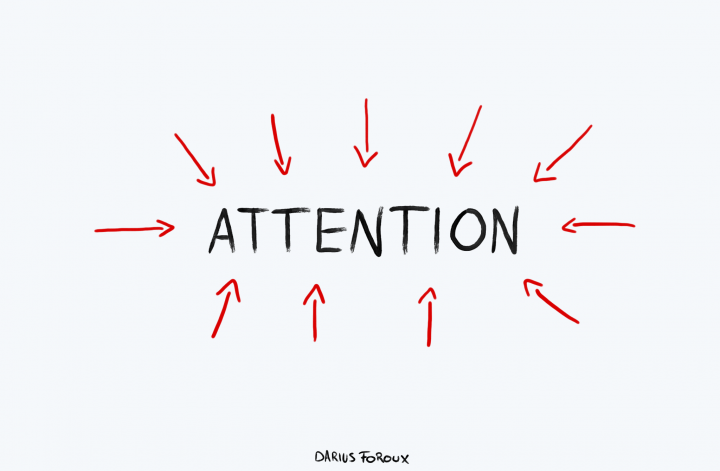Do you always worry that you didn’t do a good job? Do you always question your work and your actions? Are you afraid of admitting your mistakes? Does rejection make you feel like shit?
If so, you’re in great danger.
I’m not a perfectionist myself. At least, that’s what I try to tell myself. I bet that you try to tell yourself that as well. In fact, the people who don’t admit it are the worst.
But here’s the thing: If you’re a perfectionist, you’re just a procrastinator with a mask. It’s no different from someone who’s lazy and does nothing at all.
Don’t believe me? Let’s take a look. A perfectionist…
- Always waits for the right moment.
- Never makes mistakes.
- Always needs more time.
But at the end of the day, life and work is about outcomes. Results matter.
And if you’re a perfectionist you might get the outcomes some day. But the question is: When? And, at what cost?
Research specifically shows that perfectionism is closely related to depression and low self-esteem.
“Perfectionists are their own devils.” —Jack Kirby
Is the price of perfectionism really worth it?
I’ve found that perfectionism is just another form of procrastination. When you constantly worry about making mistakes, doubt creeps in your mind. And that causes indecision.
There are two types of perfectionists:
- The one that never starts. You want to achieve something, but you immediately start doubting yourself. You think: “I don’t think I can do it.” So you never start.
- The one that starts but has too high standards. You set a goal. You work hard (maybe too hard). But you’ve set your goals so high, that you’re always failing yourself.
Both scenarios can cause the following: Anxiety, worry, depression, and Type A behavior.
These are things that we rather avoid. Joachim Stöber and Jutta Joormann, who studied Worry, Procrastination, and Perfectionism, write:
“The combination of concern over mistakes and procrastination may be a crucial factor in the maintenance of worry. On the one hand, it may prolong existing threats because no steps are taken to cope. On the other hand, it may increase existing threats or even produce additional threats because initially solvable problems will pile up, thus creating an overload of problems that may finally be insoluble.”
And that feeling of being helpless is the biggest pitfall for us. Because what do we do when we feel helpless? Exactly—we give up. Just look at the studies about Learned Helplessness.
However, perfectionism is not always bad. In fact, some studies suggest perfectionism is related to greater achievement. But that’s not the question here.
Of course, when you set higher goals and if you have higher standards; you achieve more. Without a doubt, perfectionistic tendencies can be a good thing.
But as we all know, achieving goals is not the only thing in life. It’s more about HOW we reach our goals and aspirations.
“How can we beat the nasty side of procrastination and perfectionism?”
So we’ve talked about how procrastination and perfectionism are related, and why it can be bad. But what’s the solution?
I’ve found an interesting study by Gordon L. Flett and his colleagues; they talk about the role of learned resourcefulness to perfectionism. They suggest that learned resourcefulness can play a mediator role.
So I started looking into learned resourcefulness. And this is what I’ve found from an article by Michael Rosenbaum:
“Learned resourcefulness refers to the behavioral repertoire necessary for both regressive self-control and reformative self-control. This repertoire includes self-regulating one’s emotional and cognitive responses during stressful situations, using problem-solving skills, and delaying immediate gratification for the sake of more meaningful rewards in the future.”
Learned resourcefulness is the skill that you need to stop sabotaging yourself.
Finding a balance.

Let’s look at the opposite of a perfectionist: A slacker.
If you’re a slacker, you don’t care about much. Good enough is your motto. And you have no ambition at all.
An attitude like that doesn’t bring you anywhere. The American novelist Cormac McCarthy put it best:
“It’s like a lot of things, said the smith. Do the least part of it wrong and ye’d just as well to do it all wrong.”
Slacking is an attitude of “I don’t care.” But if you want to make things happen in your life, you have to care.
And what you want is to find a middle ground where your perfectionistic tendencies drive you, but you have the calm of a slacker, and you combine that with learned resourcefulness.
So that’s why I found a balance between perfectionism and slacking. It looks like this:

Do great work like a perfectionist, but don’t give too much attention to your goals like a slacker.
And finally, combine it with this:
- Resourcefulness — Goals can work well, but they can also be counterproductive. That’s why you want to rely on systems. And when shit hits the fan; use your problem-solving skills to figure things out.
To me, that’s the sweet spot: Instead of beating yourself up when you make a mistake or if you fail yourself, you just adjust or solve the problem.
- Avoid the perfectionist’s favorite sentence: “OMG, this is the worst thing ever!”
- Also avoid the slacker’s favorite sentence: “I don’t care.”
- But instead, you say: “I’ve got this.”
So what’s your current challenge? Actually, I don’t even have to ask: You’ve got this.
P.s. If you enjoyed this post, there’s also an infographic available that you can share with friends/family/colleagues.




